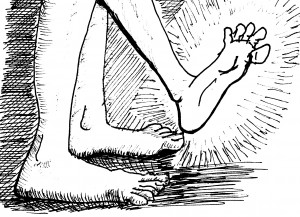When everybody knows the rule, but nobody follows it, what good is it?
It’s still of use to somebody. Usually that somebody is the one who makes the rule. I’m thinking about the highway speed limit here in Illinois. The signs say 55 miles per hour, but everybody drives at least 70. The enforcement is practically nonexistent. Whenever some crusader proposes changing the limit to 70 miles per hour, the government balks. “Oh, horrors!” the governor cries, “It’s a safety issue. Think of the children, why don’t you?”
They like people to speed, so that when they do crack down and start writing tickets, they catch boatloads of drivers, who have grown used to the normal speed being 70. It fills shortfalls in the budget. If they enforced the speed limit regularly, nearly everyone would stick to it, and they would catch only a few fine-payers. So they let the rule slide, build up the population of speeders, and then just reel them in. It doesn’t make the roads any safer. It just makes offenders of us all.
Everybody knows the English grammar rule of Good, Better, Best. If you have three apples, and one has a bruise, and the second has a worm, the wormy apple is Good, the bruised apple is Better, and the good apple is Best.
If you have only two apples, one with five worms, and the other with only one worm in it, then the five-worm apple is Good, and the one-worm apple is Better. You don’t have a Best apple. The rule is that when comparing two things, one is better than the other, and neither one is best. To have a best, you have to compare three or more things.
If that is true, then how many efforts do you have to have saved up inside your gut so you can respond when the basketball coach says, “OK, team, give our fans your best effort!”
How many of your feet do you consider before putting your best foot forward?
Your Pop shows up at your apartment unexpectedly. You check the icebox for something to offer, but all you have is a can of Pabst Blue Ribbon. When he makes a face when you show it to him, you say, “It’s the best I’ve got.”
We disregard the Rule of Three all the time. Even little kids know that they can be the best at something, if they are the only one doing it. That’s how I got the official designation of America’s Funniest Author of Books on Cooling Electronics. They couldn’t find any others.
We keep this silly rule in the English grammar books. Why? I’m betting that sooner or later English teachers will be given the authority to write us tickets for all these violations (as long as they give a generous cut to the government.) So far the worst (or best) we have to endure is their incessant “Tsk, tsk, tsk”-ing. Their rule is neither the best nor worst of silliness in the language. But it is not entirely harmless, because it encourages us to ignore all the rules, even the good ones, because it makes offenders of us all.
